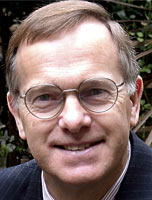
The “whole gospel” includes caring for God’s creation.

That is one important conclusion that comes from reading the landmark Cape Town Commitment (CTC) the latest signature document of the Lausanne Movement. The CTC is historically important for the entire evangelical family, but particularly for those of us involved in the creation care movement.
The document has credibility and authority because of what it is, the latest “confessional statement” of the global church as represented by the Lausanne Movement for World Evangelization, which significantly traces its own roots to John Stott and Billy Graham.
The first global meeting of Christian leaders under the Lausanne banner in 1974 gave us the Lausanne Covenant, a defacto statement of faith that gained immediate and widespread acceptance within the evangelical community.
Fifteen years later the Manila Manifesto was produced by the 1989 Lausanne World Congress meeting in Manila. This meeting was organized around the theme that has come to characterize Lausanne: “The whole church taking the whole gospel to the whole world” and the Manifesto laid the foundation for genuine partnership between the churches of the east and west, north and south, opening an era in which the “whole church” has participated in the missionary enterprise in ways unseen before.

So now we have the third volume in this series: The Cape Town Commitment. Authored by theologian and John Stott heir Chris Wright, it summarizes the gospel that we evangelicals believe and are committed to proclaiming to the world in the language of love:
We love God’ We love God’s Word’ We love God’s World’
The Cape Town Commitment brings the message of the gospel and the needs of our modern world into focus as no other document has before. It is already being used by the Lausanne Movement as the basis for a 10 year plan of action.
If the CTC is important for the evangelical church as a whole, it represents an entirely new world of opportunity for the evangelical creation care movement. Never before has a mainstream confessional document like this given so much space to the topic of creation care or addressed it in such strong language.
The Cape Town Commitment legitimizes and prioritizes creation care in one line:
Creation care is thus a gospel issue within the Lordship of Jesus Christ.
Importantly, the document arrives at this conclusion through a number of unassailable biblical assertions. For example (italics in the original):
- We share God’s passion for his world, loving all that God has made, rejoicing in God’s providence and justice throughout his creation, proclaiming the good news to all creation and all nations, and longing for the day when the earth will be filled with the knowledge of the glory of God as the waters cover the sea.1
- We love the world of God’s creation. This love is not mere sentimental affection for nature (which the Bible nowhere commands), still less is it pantheistic worship of nature (which the Bible expressly forbids). Rather it is the logical outworking of our love for God by caring for what belongs to him.
- We cannot claim to love God while abusing what belongs to Christ by right of creation, redemption and inheritance. We care for the earth and responsibly use its abundant resources, not according to the rationale of the secular world, but for the Lord’s sake. ’
- ’ to proclaim the gospel that says ‘Jesus is Lord’ is to proclaim the gospel that includes the earth, since Christ’s Lordship is over all creation. Creation care is a thus a gospel issue within the Lordship of Christ.
- Such love for God’s creation demands that we repent of our part in the destruction, waste and pollution of the earth’s resources and our collusion in the toxic idolatry of consumerism. Instead, we commit ourselves to urgent and prophetic ecological responsibility.
- Probably the most serious and urgent challenge faced by the physical world now is the threat of climate change. This will disproportionately affect those in poorer countries, for it is there that climate extremes will be most severe and where there is little capability to adapt to them’
These assertions are not entirely without controversy, and objections to portions of this section have been raised on several occasions since the Cape Town meetings. Early on, Lausanne leadership recognized that the content of these assertions would need to be explored further, and that plans for action would need to be developed based on them. To this end, Lausanne appointed me as a Senior Associate for Creation Care in 2012, with a mandate to hold a Global Consultation on Creation Care and the Gospel. This Consultation occurred in Jamaica in November of 2012, and produced another important document, the Jamaica Call to Action. Read the second post in the four part series to learn about the Two Convictions of the Jamaica Call to Action.
Footnotes
1. Psalm 145:9, 13, 17; Psalm 104:27-30; Psalm 50:6; Mark 16:15; Colossians 1:23; Matthew 28:17-20; Habakkuk 2:14.

Note from the Editor: As you may have picked up along the way, I grew up in a family with a passion for the care of God’s creation. This spilled into action during high school, majoring in Biology as an undergraduate at Grove City College, and the lifestyle of our family (from Pittsburgh back to Lancaster County, PA). When given the opportunity at Urbana12, I could not resist connecting with Ed Brown and asking him to share a glimpse of the growth of creation care in Evangelicalism. BTW, isn’t great to have an InterVarsity Press (IVP) author (Our Father’s World: Mobilizing the Church to Care for Creation), join the growing team of contributors to the Emerging Scholars Network (ESN) blog 🙂 Hoping for more IVP authors to share with us in the coming months!
If you (and possibly even a group of friends) have a particular topic to bless/explore with other Emerging Scholars, no need to be an established/published author. Please click here to learn more about writing for the blog and email email me an inquiry/proposal to begin a conversation. Looking forward to hearing from you. ~ Thomas B. Grosh IV, Associate Director of ESN.
Update: 7/30/2013, 9:18 AM. Link to The Jamaica Call to Action (Part 1): Two Convictions (Ed Brown. Emerging Scholars Network Blog. 7/30/2013).
Rev. Edward R. Brown (Ed) is the Director and CEO of Care of Creation, and has recently been named the Lausanne Senior Associate for Creation Care for the Lausanne Movement. He directs the work of Care of Creation in the US, Kenya and Tanzania, and as Lausanne Senior Associate is responsible for all of the Lausanne Movement’s creation care activities. He speaks throughout the US and internationally on the topic of Creation Care, and has been a seminar presenter at four previous Urbanas.
Ed is the author of two books: Our Father’s World: Mobilizing the Church to Care for Creation, published by InterVarsity Press in 2008, and When Heaven and Nature Sing: Exploring God’s Goals for His People and His World, just released by Doorlight Publications in December, 2012. Our Father’s World was praised by biologist and environmentalist E. O. Wilson as “beautiful and inspiring, †and author Howard Snyder says When Heaven and Nature Sing “is packed full of wisdom—wisdom that is both biblically based and ecologically sound.â€
Ed received the Bachelor of Arts degree from Gordon College and the Master of Divinity from Gordon Conwell Seminary (Pastoral Studies). He served as Chief Operating Officer for Au Sable Institute of Environmental Studies, and has worked with InterVarsity Christian Fellowship and as a pastor both in the US and overseas. He and Susanna, his wife, both grew up as children of missionaries in the country of Pakistan, and carry a love for that country and for overseas ministry with them. They live in Madison WI and have four grown children: Melanie, Tim, Katrina and Amy.
Organizational background: Care of Creation Inc. is an environmental missions organization. It was founded in 2005, “to pursue a God-centered response to environmental challenges that brings glory to the Creator, advances the cause of Christ, and leads to a transformation of the people and the land that sustains them.â€
Care of Creation seeks to “mobilize the church†in various countries to focus on creation-care as an important part of ministry. Overseas projects include education, tree-planting and agricultural programs. The organization currently has projects on the ground in Kenya and Tanzania and plans to expand to other countries in East Africa in the near future.

Why has Billy Graham’s name been crossed out in the text above?
Nola, Thank-you for bringing this “bad link” to our attention. It’s a simple change of link on the Billy Graham Evangelistic Association’s website, making the old link “bad”/invalid. I have updated the link for future readers of Ed’s post.